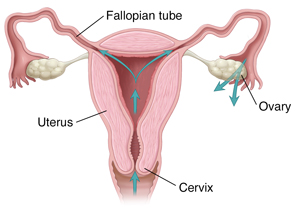What Is Pelvic Inflammatory Disease (PID)?
Pelvic inflammatory disease (PID) is inflammation of the female upper genital tract. It is due to an infection that affects organs. These include the uterus, ovaries, fallopian tubes, and cervix. It can cause severe damage to the body if not treated.
Each year, PID is diagnosed in more than a million females in the U.S. PID can causes symptoms bad enough to send you to the emergency room. But in many cases, PID is silent. It can have few or no symptoms. The infection can be treated. This can help prevent lasting damage.
Who gets PID?
PID can happen in females at any age. But most get it in their late teens or early 20s.
Many don’t know they have PID until years later. The longer you have it, the higher the risk of more health problems. The more sex partners you have, the higher the risk. You are also more likely to get PID if you have had it before.
What are the symptoms?
If PID symptoms do happen, they are similar to those of many other health problems. This can make PID hard to find. Symptoms can include:
-
Pelvic pain.
-
Pain during sex.
-
Bleeding after sex.
-
Pain when you urinate, or urinating often.
-
Fever, chills, or other flu-like symptoms.
-
Discharge from the vagina that has a bad odor or an unusual color.
-
Bleeding from the vagina that's not normal.
-
An upset stomach or you vomit.
-
Pain in the upper right belly.
How do you get PID?

PID happens when certain germs infect the sex organs. Often this happens because you are infected with an STI (sexually transmitted infection).
In a few cases, PID develops from bacteria normally found in the vagina and cervix. It can also happen if someone has recently had an IUD (intrauterine device) placed for birth control. This risk is higher in the first 3 weeks after the IUD is put in place.
Treatment can help
PID can often be cured when found and treated early.
But PID can cause severe health problems if not treated. These include damage to the reproductive organs, pelvic pain, and problems getting pregnant (infertility). In rare cases, problems caused by PID can even cause death. This is why PID should be treated as soon as possible.
Online Medical Reviewer:
Daphne Pierce-Smith RN MSN
Online Medical Reviewer:
Lalitha Kadali
Online Medical Reviewer:
Tennille Dozier RN BSN RDMS
Date Last Reviewed:
4/1/2025
© 2000-2025 The StayWell Company, LLC. All rights reserved. This information is not intended as a substitute for professional medical care. Always follow your healthcare professional's instructions.